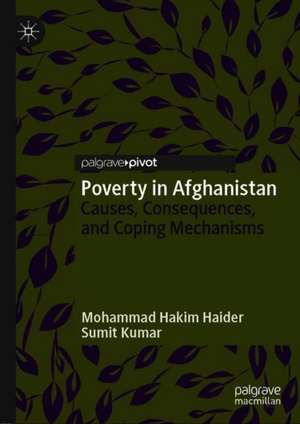Poverty in Afghanistan: Causes, Consequences, and Coping Mechanisms
Autor Mohammad Hakim Haider, Sumit Kumaren Limba Engleză Hardback – 18 ian 2019
Preț: 418.67 lei
Nou
Puncte Express: 628
Preț estimativ în valută:
80.12€ • 87.00$ • 67.30£
80.12€ • 87.00$ • 67.30£
Carte tipărită la comandă
Livrare economică 23 aprilie-07 mai
Preluare comenzi: 021 569.72.76
Specificații
ISBN-13: 9783030108588
ISBN-10: 3030108589
Pagini: 103
Ilustrații: XII, 154 p. 1 illus.
Dimensiuni: 148 x 210 mm
Greutate: 0.35 kg
Ediția:1st ed. 2018
Editura: Springer International Publishing
Colecția Palgrave Pivot
Locul publicării:Cham, Switzerland
ISBN-10: 3030108589
Pagini: 103
Ilustrații: XII, 154 p. 1 illus.
Dimensiuni: 148 x 210 mm
Greutate: 0.35 kg
Ediția:1st ed. 2018
Editura: Springer International Publishing
Colecția Palgrave Pivot
Locul publicării:Cham, Switzerland
Cuprins
1. Introduction.- 2. Poverty in Afghanistan: Temporal and Spatial Patterns.- 3. Distinguishing Characteristics of Poor in Afghanistan.- 4. Determinants of Poverty in Afghanistan.- 5. Shocks and Coping Strategies of the Poor.- 6. Consequences of Poverty in Afghanistan.- 7. Conclusion.
Notă biografică
Dr. Mohammad Hakim Haider is Associate Professor at the Institute of Economics, at the Academy of Sciences of Afghanistan.
Dr. Sumit Kumar is Assistant Professor at the Department of Economics, Sri Guru Granth Sahib World University, India.
Textul de pe ultima copertă
This book examines the patterns, characteristics, causes and coping mechanisms of the poor in Afghanistan applying econometric and statistical techniques. The authors address and identify the extent of poverty in Afghanistan over the years, the spatial patterns and regional imbalances of poverty in Afghanistan, the distinguishing characteristics of the poor in Afghanistan, and explore shocks faced by the poor in Afghanistan as well as subsequent coping strategies. Based on household level data collected under the ‘National Risk Vulnerability Assessment’ (NRVA) survey of 2003, 2005, 2007/08 and 2011/12 of Afghanistan, the authors identify options that may enable policy makers and other stakeholders to further enable the inclusion of the poor in development processes and to successfully cope with poverty and its adverse outcomes. This short book will be of interest to students, researchers, academicians, policymakers, international agencies and NGOs at international and national levels.
Caracteristici
Presents quantitative and econometric analysis of the causes, consequences, and coping mechanisms of the poor Utilises three approaches (Calorie poverty line, Food Poverty line, and Total consumption poverty line) to study the pattern of poverty in Afghanistan Fills an important gap in addressing the position of donors in the rejuvenation of the Afghan economy
